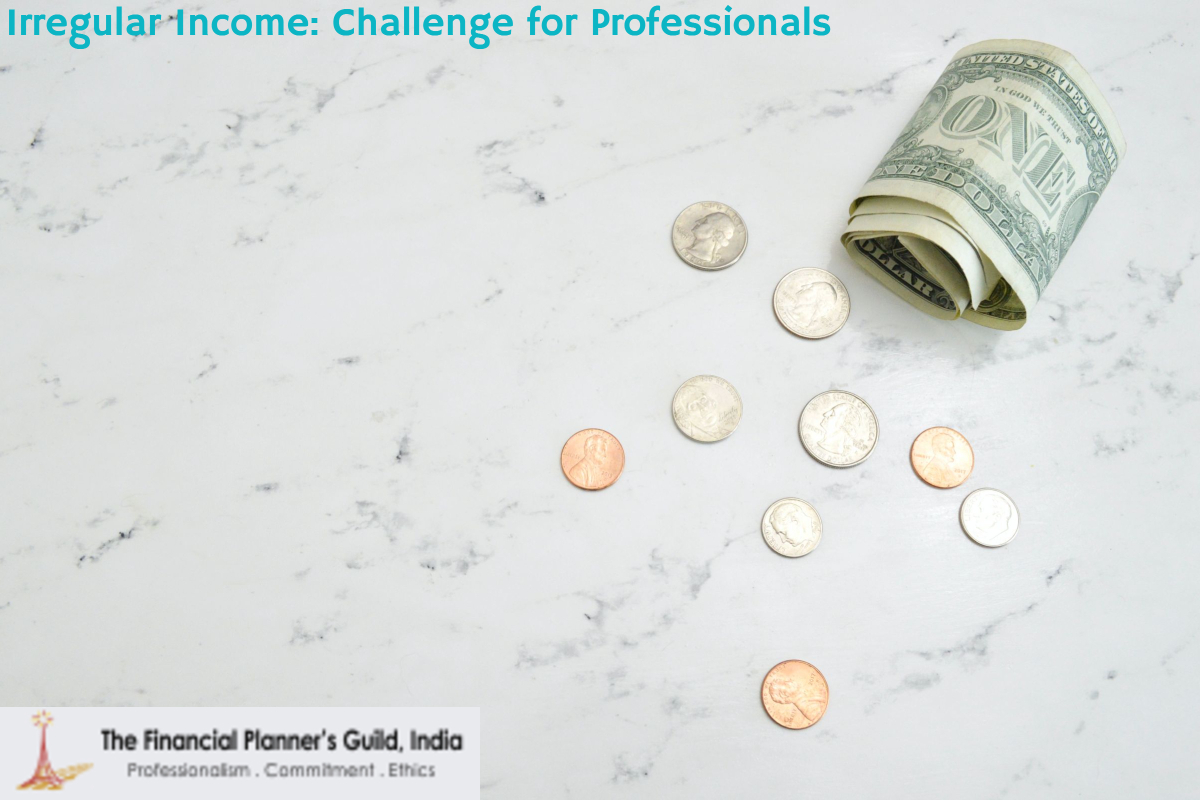 Are you a Doctor, Lawyer, Architect, Financial Planner, Musician, Artist, Interior Designer, Fashion Designer, Journalist, Graphic designer or an Astrologer pursuing your profession independently? If yes, then what haunts you probably is the scourge of Irregular Income!
Are you a Doctor, Lawyer, Architect, Financial Planner, Musician, Artist, Interior Designer, Fashion Designer, Journalist, Graphic designer or an Astrologer pursuing your profession independently? If yes, then what haunts you probably is the scourge of Irregular Income!
It is fine to pursue your creative instincts or independent status if you either have an inheritance or regular income from your investments or through a considerate , income earning spouse! But it is still not simple when there are myriad expenses in the form of school fees, electricity bills, petrol bills, restaurant bills and EMIs.
There is no one-size-fit-all solution to this problem. Any strategy you may want to follow is dependent on the following questions:
- What’s your profession? Is your income regular or seasonal?
- What is your standing in your job market? Can you easily make a switchover, if required
- How long can you sustain, given your current background and experience? What’s your competitive edge? What will you need to enhance yourself further?
- Do you have any fallback option, in case your practice tapers off?
- How is your health? What about your dependent family members?
- How many dependents do you have? How long do you need to support them? Is there any addition in the family planned? Will you be able to support that comfortably?
- What is your risk taking ability?
- What are your short term and long term life goals? What is your savings & expenditure pattern?
- What is your current assets/ liabilities situation?
A Comprehensive Financial Plan can answer all these pertinent questions and have a strategy to deal with various situations that we may come across – simply because we have thought through the whole thing and have a plan to deal with them. While a comprehensive financial plan will be the most useful, some scrutiny and introspection to find answers, will work for many. Find answers to these and breathe easy –
1. Inspect the lowest earning months: Examine the reasons. If you have reason to believe that in future too the income may be low in certain months, it is a good idea to make provisions to take care of the deficits that may show up in those months. Also, it is a good idea to pare down expenses in those months to the minimum to cushion the impact.
2. Make your income, tax efficient: Decide your tax status. Be it filing tax as a consultant or a sole proprietor running a firm. Both has its advantages and disadvantages. Make maximum use of all applicable deductions like 80c, 80 D. Keep long term horizons to take advantage of Long term capital gains status.
3. Create an emergency fund: Keep aside 8 to 10 months expenses plus insurance premiums plus EMis in fixed deposit. This will allow you to pursue your practice without the stress of looking over the shoulder all the time and getting worked up on the income and expenses.
4. Take Insurance: Take insurance cover for death, disability, general health of the family, assets and most importantly Professional indemnity.
5. Create a Regular expenses fund: This is different from the emergency fund. This fund is required to take care of your expenses when your income fluctuates. Most of your monthly and annual expenses remain same in short run. Extrapolate your expenses for the year and keep adding to the fund. It will be useful if all major family members have access to this fund.
6. Shy away from loans: Long term loans are long term commitments whereas it may not be possible for you to forecast your earnings for more than a year or two. So make maximum purchases on down payment. If it is a big purchase like house then count EMIs for house loan as regular expense and fund for it in advance.
Avoid rolling over your credit card balances. Liquidate your investments rather than taking personal loans, as far as possible. Taking loans for investments is Big No…No.
7. Keep parking your earnings in Debt instruments for further investments: This will take care of various sips as well. You can further invest in equities or alternate asset class as per your risk profile and money available for investments.
8. Retirement Planning: The best part of being an independent professional is that, you Never retire! You can work as long as your health permits. Like an old wine your experience is more valuable provided you keep yourself updated.
This gives you more time to build retirement corpus and leave more money for other goals.
9. Keep exploring Job options: This will help you analyze competition and will give you more confidence while charging or increasing your fees.
10. Make a professional enhancement fund: World is a global village now. People travel across the world and see new things which they expect and demand back home. Your clients can one of those & hence your practices should be able to match those expectations or you will lose them in long run.
One must focus on his core area of strength. Do what you are able to do the best! And leave other tasks to experts. It holds true for personal financial planning as well. It should be better handled by Practicing Financial Planners who have, over the years, learnt both the Science and Art part of Financial Planning.
Hi Shilpi,
A damn good and informative Article.
-Gaurav
Thanks Gaurav!
Shilpi